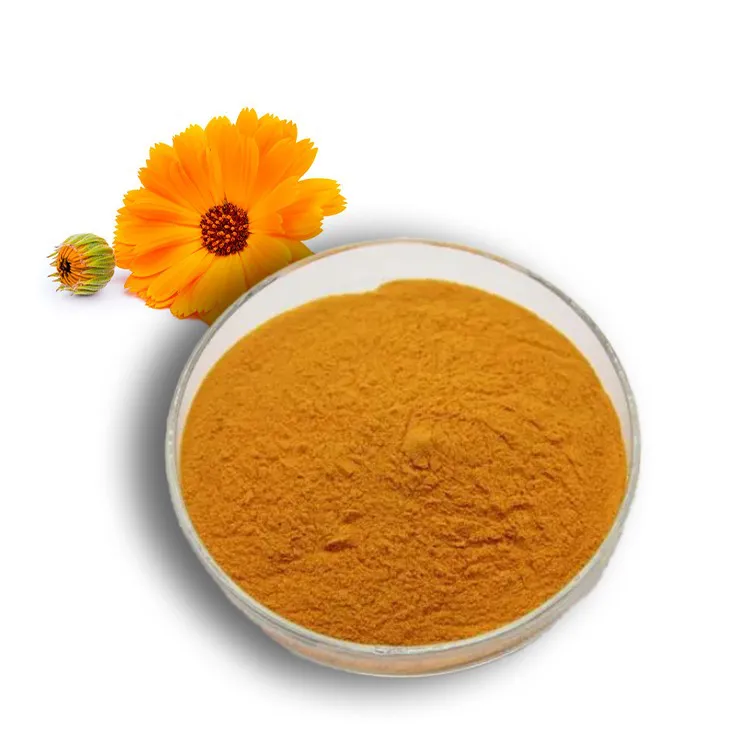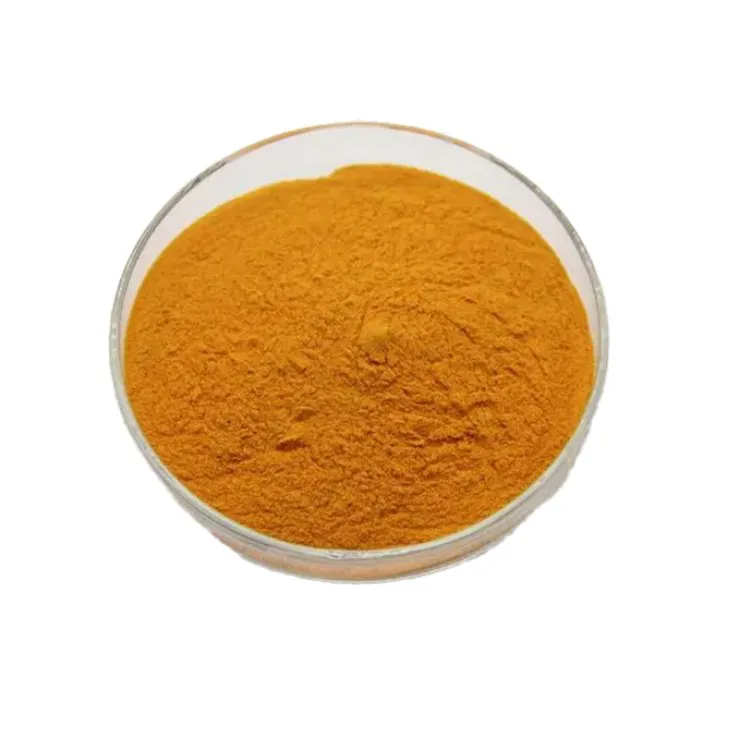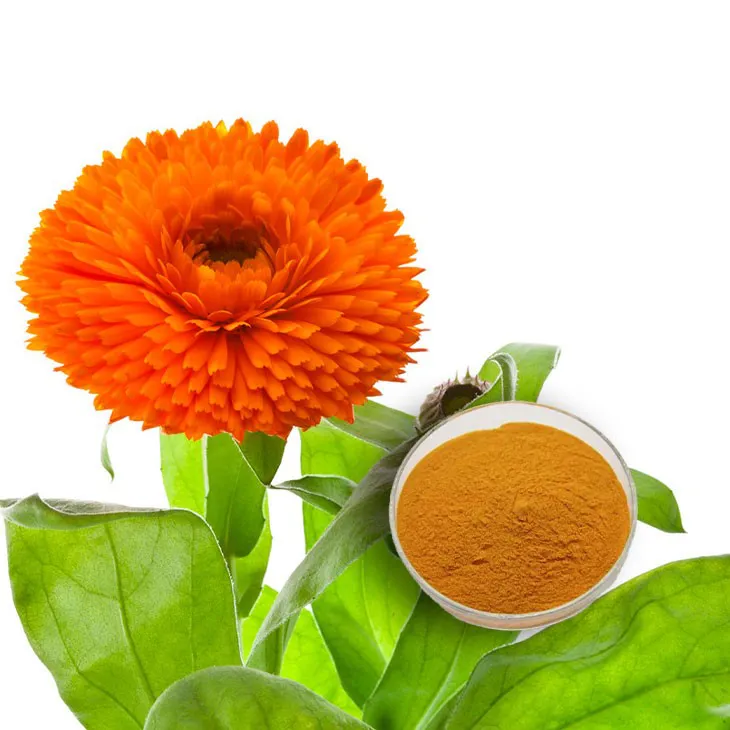- 0086-571-85302990
- sales@greenskybio.com
Calendula Extract: Benefits, Uses and Possible Side Effects
2024-11-13

Introduction
Calendula, scientifically known as Calendula officinalis, is a plant that has been used for centuries in traditional medicine. Calendula Extract, derived from this plant, is becoming increasingly popular in modern natural remedies. This article will explore the various benefits, uses, and possible side effects of Calendula Extract, providing valuable information for those interested in harnessing the power of natural substances.

Benefits of Calendula Extract
Skin Health
1. Anti - inflammatory properties: Calendula extract is renowned for its anti - inflammatory effects on the skin. It can help soothe skin conditions such as eczema, dermatitis, and psoriasis. The compounds in calendula, including flavonoids and triterpenoids, work to reduce redness, swelling, and itching associated with these inflammatory skin disorders.
2. Wound healing: It has been used for centuries to promote wound healing. Calendula extract stimulates the production of collagen, a protein essential for skin repair. It also has antimicrobial properties, which can help prevent infections in open wounds. Whether it's a minor cut, scrape, or a more serious wound, calendula extract can be a valuable addition to the healing process.
3. Skin hydration: Calendula extract helps to keep the skin hydrated. It forms a protective barrier on the skin's surface, preventing moisture loss. This is particularly beneficial for people with dry or sensitive skin, as it can improve the skin's overall texture and appearance.
Internal Health Benefits
1. Digestive health: Calendula extract may have a positive impact on the digestive system. It can help soothe an irritated digestive tract, reducing symptoms such as indigestion, bloating, and abdominal pain. Some studies suggest that it may also have a mild anti - spasmodic effect, which can be helpful for those with digestive spasms.
2. Anti - microbial activity inside the body: The anti - microbial properties of calendula extract are not limited to the skin. It can also act against certain harmful microorganisms in the body. This may be beneficial in supporting the immune system and preventing infections, especially in the gastrointestinal tract.
3. Anti - cancer potential: While more research is needed, some preliminary studies have shown that calendula extract may have anti - cancer properties. It is believed to work by inhibiting the growth of cancer cells and inducing apoptosis (programmed cell death). However, it should not be considered a substitute for conventional cancer treatments but rather a complementary approach that may be explored under the guidance of a healthcare professional.

Uses of Calendula Extract
Topical Applications
1. Skincare products: Calendula extract is a common ingredient in many skincare products, including creams, lotions, and ointments. It can be used to treat a variety of skin conditions, as mentioned earlier. For example, calendula - based creams are often recommended for diaper rash in infants, as they are gentle on the skin and have anti - inflammatory and anti - microbial properties.
2. Compresses: A calendula compress can be made by soaking a clean cloth in a calendula extract solution. This can be applied to the skin for various purposes, such as reducing swelling around an injury or soothing irritated skin. The compress should be applied gently to the affected area and left in place for a short period, usually 10 - 15 minutes.
Internal Consumption
1. Herbal teas: Calendula flowers can be dried and used to make herbal teas. Drinking calendula tea may offer some of the internal health benefits mentioned above, such as digestive support. However, it should be noted that excessive consumption may lead to side effects, so it is advisable to follow recommended dosages.
2. Tinctures: Calendula tinctures are concentrated liquid extracts. They can be taken orally, usually diluted in water or another liquid. Tinctures are a convenient way to consume calendula extract, especially for those who prefer a more potent form of the herb. However, they should be used with caution, as the high concentration may increase the risk of side effects if not used properly.

Possible Side Effects of Calendula Extract
While calendula extract is generally considered safe for most people, there are some possible side effects to be aware of:
- Allergic reactions: Some individuals may be allergic to calendula. Allergic reactions can range from mild skin rashes to more severe symptoms such as difficulty breathing or swelling of the face, lips, or tongue. If you experience any signs of an allergic reaction after using calendula extract, discontinue use immediately and seek medical attention.
- Interactions with medications: Calendula extract may interact with certain medications. For example, it may enhance the effects of blood - thinning medications, increasing the risk of bleeding. It is important to inform your healthcare provider if you are taking any medications before using calendula extract, especially if you are on medications for blood - clotting disorders, diabetes, or high blood pressure.
- Gastrointestinal issues: In some cases, excessive consumption of calendula extract, especially in tincture form, may cause gastrointestinal upset, including nausea, vomiting, and diarrhea. To avoid these issues, it is important to follow the recommended dosages and consult a healthcare provider if you have any pre - existing digestive problems.

Conclusion
Calendula extract offers a wide range of benefits, from promoting skin health to potentially providing internal health support. It has been used in traditional medicine for centuries and is now finding its place in modern natural remedies. However, it is important to be aware of the possible side effects and use it responsibly. Whether you choose to use it topically or internally, always consult a healthcare provider if you have any concerns or pre - existing health conditions. With proper use, calendula extract can be a valuable addition to your natural health toolkit.
FAQ:
What are the main benefits of calendula extract for skin health?
Calendula extract has several benefits for skin health. It has anti - inflammatory properties, which can help reduce redness, swelling, and irritation. It is often used to soothe skin conditions such as eczema, dermatitis, and minor burns. Calendula extract also has antioxidant properties that can protect the skin from damage caused by free radicals, potentially slowing down the aging process of the skin.
How can calendula extract be used internally?
Calendula extract can be used internally in a few ways. It can be made into a tea, which may have digestive benefits such as soothing an upset stomach, reducing inflammation in the digestive tract, and potentially helping with minor gastrointestinal disorders. However, it should be used in moderation and under the guidance of a healthcare professional, as excessive use may have adverse effects.
Are there any side effects of using calendula extract?
While calendula extract is generally considered safe for most people, some possible side effects may occur. In some cases, it can cause allergic reactions, especially in those who are allergic to plants in the Asteraceae family. Skin irritation may also occur if it is applied topically in a concentrated form or on very sensitive skin. Additionally, if used internally in large amounts, it may cause digestive upset.
Can calendula extract be used on all skin types?
Calendula extract is generally suitable for most skin types. Its anti - inflammatory and soothing properties make it beneficial for dry, sensitive, and irritated skin. However, as with any product, it is advisable to do a patch test first, especially for those with very sensitive skin or a history of allergies. If there is no adverse reaction after the patch test, it can usually be used on the skin.
How does calendula extract compare to other natural skin remedies?
Compared to other natural skin remedies, calendula extract has its own unique properties. For example, compared to aloe vera, which is also known for its soothing properties, calendula extract may have stronger anti - inflammatory effects in some cases. However, different natural remedies work in different ways and for different skin conditions. Some may be more effective for moisturizing, while calendula extract is often more focused on reducing inflammation and irritation. It also depends on the individual's skin type and the specific skin issue being addressed.
Related literature
- The Therapeutic Properties of Calendula officinalis: A Review"
- "Calendula Extract in Skin Care: A Comprehensive Analysis"
- "Internal Uses of Calendula: Benefits and Risks"
- ▶ Hesperidin
- ▶ Citrus Bioflavonoids
- ▶ Plant Extract
- ▶ lycopene
- ▶ Diosmin
- ▶ Grape seed extract
- ▶ Sea buckthorn Juice Powder
- ▶ Fruit Juice Powder
- ▶ Hops Extract
- ▶ Artichoke Extract
- ▶ Mushroom extract
- ▶ Astaxanthin
- ▶ Green Tea Extract
- ▶ Curcumin
- ▶ Horse Chestnut Extract
- ▶ Other Product
- ▶ Boswellia Serrata Extract
- ▶ Resveratrol
- ▶ Marigold Extract
- ▶ Grape Leaf Extract
- ▶ New Product
- ▶ Aminolevulinic acid
- ▶ Cranberry Extract
- ▶ Red Yeast Rice
- ▶ Red Wine Extract
-
Tongkat Ali Extract
2024-11-13
-
Resveratrol extract
2024-11-13
-
Berberis aristata Extract
2024-11-13
-
Green Tea Extract
2024-11-13
-
Genistein
2024-11-13
-
Almond Extract Powder
2024-11-13
-
Alisma Extract
2024-11-13
-
Yam Extract
2024-11-13
-
Milk Thistle Extract
2024-11-13
-
Ivy Extract
2024-11-13





















